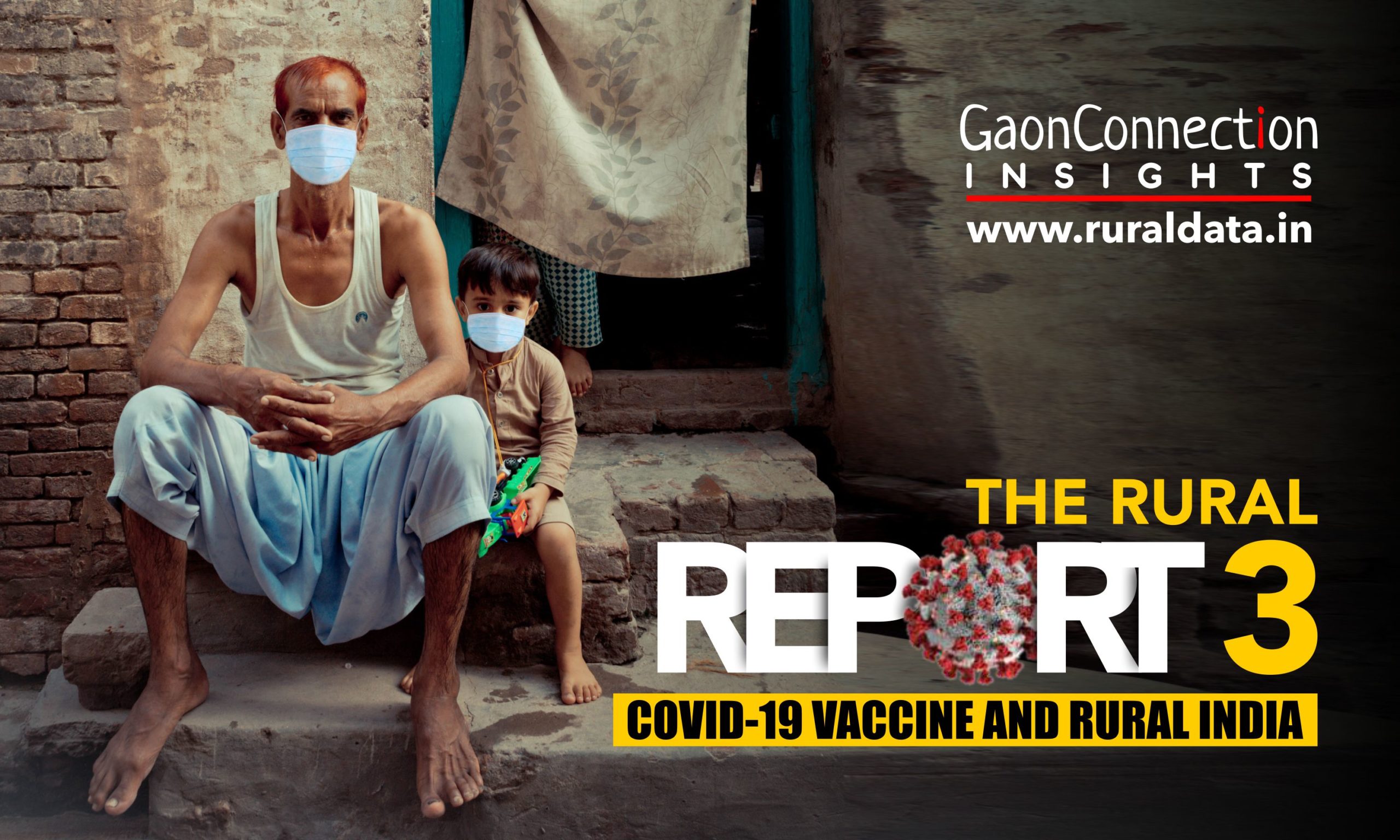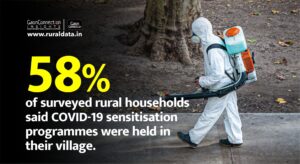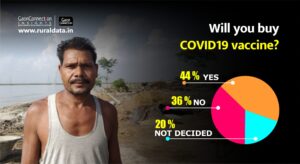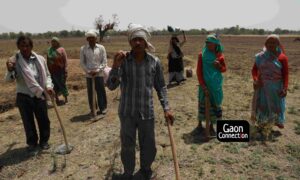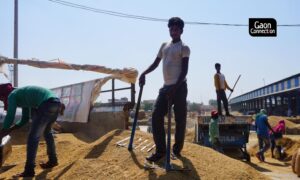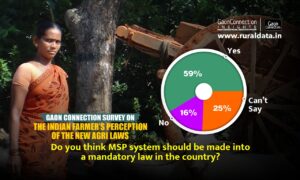Half of rural Indians surveyed across 16 states and one union territory said they would trust a coronavirus vaccine offered by an Indian company rather than an international one, and a little less than half said they would vote for any political party that helps them get the vaccine for coronavirus disease for free, according to a rapid survey by Gaon Connection.
Some 15 per cent households in rural areas of India reported at least one person in their household/friend circle testing positive for COVID 19. Rural citizens also said they are spending more money on immunity-boosting products, vegetables and fruits, much less on non-vegetarian food, and the majority have stopped eating outside food.
At least 51 per cent of respondents in rural India called the coronavirus crisis a “conspiracy by China”. Twenty-two per cent said it was the failure of citizens to observe precautions, whereas about 18 per cent saw it as the government’s failure.
Slightly less than half (44%) of the respondent households expressed that they would like to pay and get the coronavirus vaccine. Meanwhile, 36 per cent said they would not pay for it.
Around one-fifth of the respondents said they did not think the coronavirus was still around.
These are among the key findings of the first of its kind survey on the perceptions of rural Indians around the coronavirus vaccine by Gaon Connection Insights, the data and insights arm of India’s biggest rural media platform Gaon Connection. The survey, released as ‘The Rural Report 3: COVID-19 Vaccine and Rural India’ and available in full for a free download on www.ruraldata.in.
The face-to-face survey, conducted between December 1 and December 10, was carried out by Gaon Connection surveyors among 6,040 rural respondents across 60 districts in 16 states and one union territory. The selection of states, covering all regions of the country, was based on the prevalence of COVID-19 as per the COVID data of the Union ministry of health and family welfare, Government of India.
The survey had a margin of error of 5 per cent and a 95 per cent confidence level.
In the Gaon Connection survey, states covered under the north zone include Uttar Pradesh, Bihar, Jharkhand, Himachal Pradesh, Punjab, Jammu and Kashmir, Haryana. States in the south zone include Kerala, Andhra Pradesh, Karnataka. The west zone includes Maharashtra, Gujarat, Madhya Pradesh; whereas the east-northeast zone includes Odisha, Assam, West Bengal, Arunachal Pradesh.
Almost 47 per cent of villagers in rural areas of India said they would vote for the political party that offers them the coronavirus vaccine for free. However, the higher the education level of a respondent, the lesser was the likelihood of her/him voting for such a party. Meanwhile, 27 per cent respondents said a free COVID-19 vaccine would not influence which political party they vote for in the next election.
Vaccine and voting aside, half the rural citizens said they trusted the coronavirus vaccine offered by an Indian company (50.5%) as against any international company (16%), with 29 per cent saying they trusted any vaccine recommended by the Indian government.
Around one-fourth of the total 6,040 respondent households reported that samples from at least one member of their household was taken for the testing of COVID-19. The proportion of such households was the highest (42.6%) in the east-and-northeast zone, whereas it was the lowest in the north zone (10.9%).
Of the 25.9 per cent respondent households who reported their family member(s) getting tested for COVID-19, more than half, that is 59 per cent, said at least one person in their household had tested positive for the coronavirus. Overall, 15 per cent of the total 6,040 respondent households reported at least one person in their household/friend circle testing positive for COVID 19.
Among the rural residents who were tested for coronavirus, it was found that in the south zone three out of every four households (75.9%) tested positive for COVID-19, the highest in the country. In contrast, it was the lowest in the north zone where only 12 per cent rural households tested positive.
Slightly less than half (44%) of the respondent households expressed that they would like to pay and get the vaccine. Meanwhile, 36 per cent said they would not pay for it. In the north zone, the highest percentage of households (51%) expressed their willingness to pay for the corona vaccine followed by east-northeast (47%), west zone (37 per cent) and south zone (33 per cent).
Of those who were willing to pay for the vaccine, around two-third such respondents said that they would like to pay less than Rs 500 for two doses of COVID vaccine and, another one-fourth reported they would like to pay between Rs 500 and Rs 1,000 for two doses of COVID vaccine.
Interestingly, the ongoing pandemic has shown the importance of government hospitals, as the Gaon Connection survey found that two-third (66.5%) of the respondents said they got COVID treatment in a government hospital and only 11 per cent went to private hospitals.
The survey also found that half the respondents were spending more money in the corona period on buying and consuming packaged immunity boosting products, such as Chyawanprash, giloy, kadah, vitamin tablets, etc. COVID-19 has also changed the food habits of rural citizens with almost 70 per cent respondents (of the 54% total respondents who said they consumed non0veg food items) saying they had stopped eating outside food. Over 33 per cent said they had started eating more vegetables, whereas 30 per cent said they were eating more fruits.
Almost 54 per cent of the total respondent households said they consumed non-vegetarian food items such as eggs, chicken, meat, fish, etc. Of these, almost 40 per cent respondents reported that their consumption of non-veg food items had reduced in the corona period. Almost nine per cent households reported that during the COVID 19 period they were not eating non-veg items anymore. There has been a fear that coronavirus is spread through consuming poultry and non-veg items.
A number of rural households are still facing food scarcity in the pandemic. As part of the Gaon Connection survey, every fourth BPL respondent household said its family members weren’t getting enough food to eat. On the basis of ration card, 48 per cent of the total respondents of this survey were Below Poverty Line (BPL), 45 per cent were Above Poverty Line (APL) and five per cent belonged to Antodaya Yojana (AAY).
Only 18 per cent citizens saw the coronavirus crisis as a failure of the government. This corresponds with the findings of another national survey done by Gaon Connection Insights among 25,300 respondents this summer across 20 states and three Union Territories, in which Prime Minister Narendra Modi’s National Democratic Alliance government had high approval ratings of 74 per cent on its handling of the pandemic aftermath.

